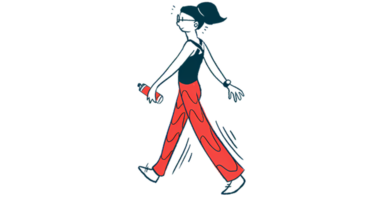Parkinson’s fatigue is a regular challenge for many, including Dad
The exhaustion can be emotional as well as physical

The sun peeked through the window at 8 a.m. on a weekday morning, and I found myself wanting to shut the world out.
The day before, I’d hiked 12 miles through the Rocky Mountains with a friend, and my chronic illness had made it difficult to rebound from the exertion. I was fatigued even after sleeping for 24 hours straight.
Although I looked fine on the outside, internally, my body was demanding a nap. As I navigated through these sensations, I realized that this was what Parkinson’s disease demanded of my dad on a regular basis.
Fatigue is a common symptom of Parkinson’s. It can rear its ugly head at any time, but it’s most often noticed during the early stages of the disease. My dad noticed a dip in his energy around the time of his diagnosis, but 10 years later, he’s noticing further shifts in his habits.
He recently told me, “I suffer from fatigue. I used to take 15-minute naps, but now they last for 30 or even 45 minutes.” His fatigue lasts longer as his disease progresses, demanding more rest and less exertion.
He went on to explain that he notices this symptom most in the afternoons. “I feel fatigued sometimes during the day — emotional fatigue more than physical,” Dad said.
And he isn’t alone in his experience. Last year, my fellow columnist Jamie Askari wrote about her husband Arman’s fatigue and how it affects his days. She aptly pointed out that many Parkinson’s patients struggle to sleep through the night, that fatigue is a side effect of many common Parkinson’s medications, and that most patients struggle with the symptom at some point on their journey. While Jamie and Arman have yet to find a solution to his regular bouts of fatigue, they’re searching for ways to manage it.
As for Dad, he continues to battle this symptom along with the apathy it brings to his life. “You don’t have the motivation to do much,” he said. “Fatigue kind of takes your motivation away.”
Yet he manages to stay optimistic and hopeful that researchers will develop new solutions for managing Parkinson’s progression and fatigue. “I’m holding out for a drug to slow the progression down. I know they’re working on it,” he said.
Do you or a loved one experience Parkinson’s fatigue? Please share any tips or insight in the comments below.
Note: Parkinson’s News Today is strictly a news and information website about the disease. It does not provide medical advice, diagnosis, or treatment. This content is not intended to be a substitute for professional medical advice, diagnosis, or treatment. Always seek the advice of your physician or another qualified health provider with any questions you may have regarding a medical condition. Never disregard professional medical advice or delay in seeking it because of something you have read on this website. The opinions expressed in this column are not those of Parkinson’s News Today or its parent company, Bionews, and are intended to spark discussion about issues pertaining to Parkinson’s disease.








Christine Scheer
Hi Mary-Beth! Yes! The fatigue is real! I understand the emotional fatigue as well. Even visiting with friends and family is exhausting, even if it’s a short visit. Great column topic, thanks, Christine
ken mair
.HI. I look forward to my naps sometimes. Twice a day and wake up refreshed but can hardly walk when i wake up due to freezing. that is after an overnight sleep.
POST COMMENT
LayTuan Tan
Has anyone read this article in the Johns Hopkins Medicine Center on PD and fatigue
https://www.hopkinsmedicine.org/health/conditions-and-diseases/parkinsons-disease/how-to-fight-parkinsons-diseaserelated-fatigue#:~:text=Parkinson%27s%20disease%2Drelated%20fatigue%20is,weariness%20that%27s%20different%20from%20sleepiness.
I hope the link works. And I don't know if it provides any solutions to the fatigue issue.
I'm in my 4th year of PD and lately I have been experiencing bouts of extreme fatigue. I don't know how "low" a dosage they're referring to in the article. I was taking only 2 doses of Sinemet as my tremors were not severe but my doctor has increased my IR C/L dosage to 3X daily plus 1 ER C/L at bedtime to help with sleep. I just started this new regime so I can't tell the effects yet.
LayTuan Tan
Carmelaf
Thanks for raising this significant issue, as fatigue is debilitating and there seems to be little around to alleviate the symptoms.
My husband was diagnosed with PD 10 years ago and has in the past couple of years suffered from fatigue which interferes with his day and interferes with any future planning.
interestingly the fatigue came about soon after he had DBS for motor symptoms.
He tried a number of medications but these did little. His sleep physician found he had sleep apnea and he now wears a CPAP machine and he has also reduced his DBS stimulation which means he suffers more from stiffness and cramps.
Can you win with PD?
These tactics have helped even, if it hasn’t resolved the problem of fatigue.
Jean Mellano
I suffer from PD fatigue . It can be debilitating at times. Sometimes I am so fatigued I think I will collapse. Most of my days are spent on a recliner and I can’t keep my eyes open past 730pm. I used to be an athlete and a dancer and cycled up to70 miles per week and danced 8-10 hours per week . I no longer am motivated to do anything but force myself to move every day. Pd is a beast of a disease.
Lucille Leader
In Parkinson's disease cellular energy metabolised by the mitochondria may be compromised. It may be useful to discuss assessment and support of this metabolic pathway with your doctor and dietician/nutritional therapist to have appropriate nutritional support, should this be the case. There is peer reviewed research to support this. However, it is extremely important to discuss OTHE POSSIBLE REASONS for the fatigue with your doctor, as the fatigue may be caused by other health concerns which need attention.....and so what is known as "differential diagnosis" is always necessary to find the actual cause so that the correct therapy can be offered.